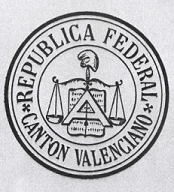Cantonal rebellion

The Cantonal rebellion was a cantonalist uprising that took place during the First Spanish Republic, starting on July 12 of 1873 in Cartagena. In the following days it spread through many regions including, Valencia, Andalusia (especially Granada[1][2]), Cartagena (which endured for several months the besieging army of Nicolás Salmerón) and in the provinces of Salamanca and Ávila, all of them in places that came to articulate cantonalism. It can also be noted, the attempt to establish cantons took place in Extremadura, Coria, Hervás and Plasencia. Pi y Margall, seeing that cantons declared independent by the tardiness of the taxation of improvements, resigned from his post to be succeeded by Salmerón.
The Catalan politician Francesc Pi i Margall became the principal translator of Pierre-Joseph Proudhon's works into Spanish[3] and later briefly became president of Spain in 1873 while being the leader of the Democratic Republican Federal Party. According to George Woodcock "These translations were to have a profound and lasting effect on the development of Spanish anarchism after 1870, but before that time Proudhonian ideas, as interpreted by Pi, already provided much of the inspiration for the federalist movement which sprang up in the early 1860's."[4] According to the Encyclopædia Britannica "During the Spanish revolution of 1873, Pi y Margall attempted to establish a decentralized, or “cantonalist,” political system on Proudhonian lines."[5]
See also
References
| Spanish Wikisource has original text related to this article: |
- ↑ El Imparcial. Madrid. 26 July 1873, p. 3
- ↑ El Imparcial. Madrid. 22 de diciembre de 1873, p. 2
- ↑ George Woodcock. Anarchism: a history of libertarian movements. Pg. 357
- ↑ George Woodcock. Anarchism: a history of libertarian movements. Pg. 357
- ↑ "Anarchism" at the Encyclopædia Britannica online.
- Digital copy of El Cantón Extremeño. (in Spanish)
External links
- Cartagena-Cantón-1873, a group making a historical reenactment of the canton of Cartagena.